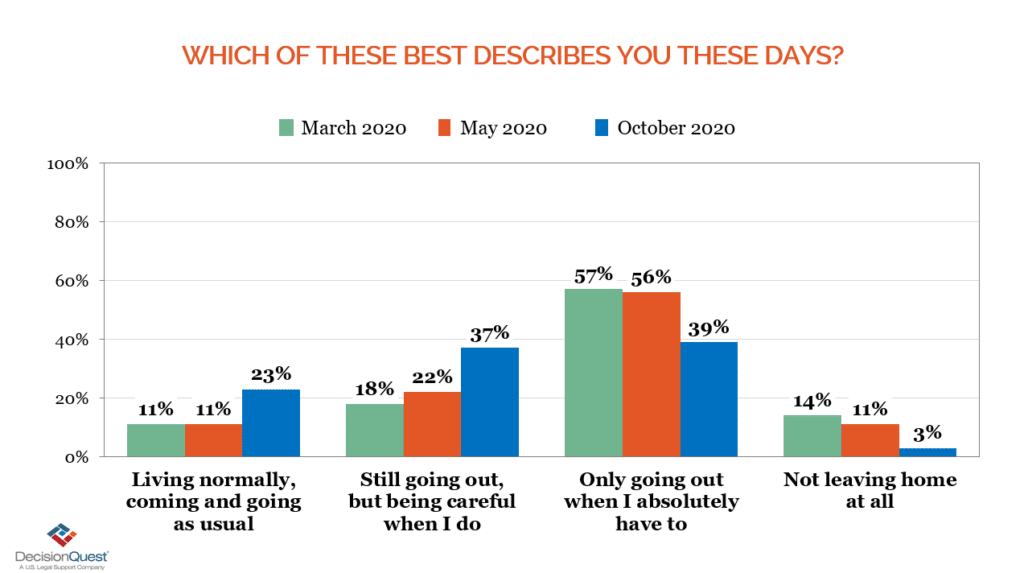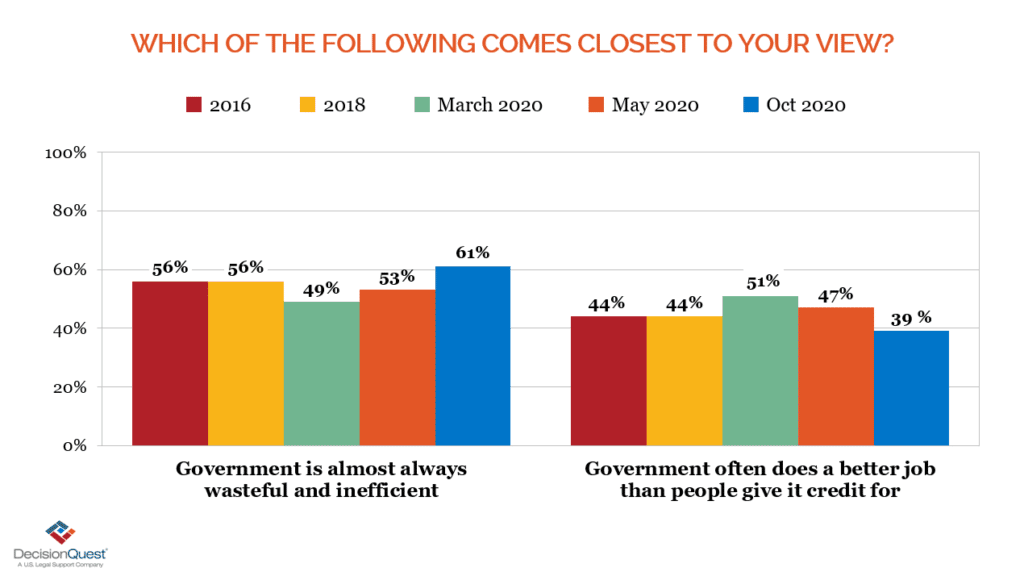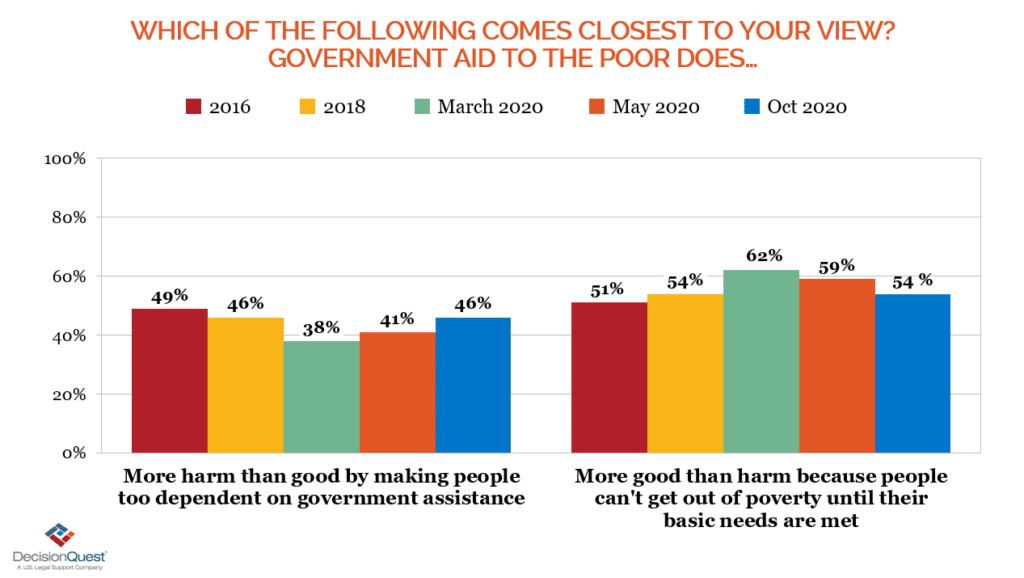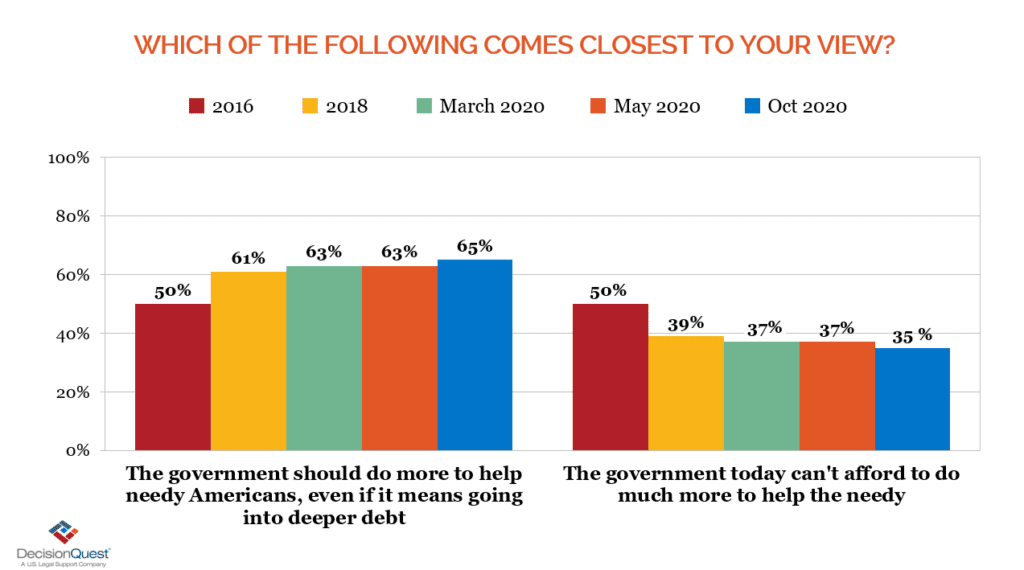The Question Isn’t “If” the COVID-19 Pandemic Will Influence Jurors, It’s “How” It Will Influence Jurors

As the new year commences and the pandemic continues, courts across the country are attempting to resume jury trials as quickly as possible, while also focusing on public health concerns. In this context, we reflect on the data DecisionQuest has collected at various points throughout 2020, and in years prior, to understand how the pandemic has impacted prospective jurors and identify important issues to consider as the nation moves forward with jury trials.
DecisionQuest evaluated the responses of a demographically diverse sample of approximately 3,000 jury-eligible participants over the course of three separate surveys conducted in March, May, and October 2020. We anticipate another survey to be launched and published this coming March. Participants responded to 100 questions designed to understand prospective jurors’ reactions to the COVID-19 pandemic and how those reactions might impact juror decision making. Each survey also included three different sample case summaries and participants were asked to provide verdict decisions for each scenario. The sample size, locations, and scenarios for each of the surveys are as follows:
- In March 2020, almost 900 participants from the Los Angeles, Chicago, Miami, Middlesex County, NJ, San Francisco, and New York City areas were presented with case summaries regarding Asbestos, Sexual Harassment, and Talc Asbestos.
- In May 2020, just under 1,000 participants from the Los Angeles, Chicago, Miami, Middlesex County, NJ, New York, Houston, and Minneapolis areas were presented with case summaries regarding Contracts, Talc Asbestos, and Whistleblowers/Unsafe Work Conditions.
- In October 2020, a little over 1,000 participants from the Los Angeles, Chicago, Miami, New York, Houston, Philadelphia, and Charlotte,NC areas were presented with case summaries regarding Contracts, Insurance, and Medical Malpractice.
While there were strong similarities in the responses to these surveys across venues, it should be noted that as robust as these findings were, the data for these surveys came from large metropolitan areas, are based on general case summaries, and were measured at specific points in time. As such, the findings may not be generalizable to other cases if the venues and facts are different. In order to appropriately apply such research findings, we recommend that counsel conduct case- and venue-specific jury research. Nevertheless, our data shows that some reactions to the COVID-19 crisis do correspond with favorability toward plaintiffs or defendants, and there are consistencies across different fact patterns. These findings may be worth considering in specific cases going to trial in the near future.
How Juror Attitudes are Impacted as a Result of COVID-19
Our research to date consistently shows that the impact and concern about COVID-19 influences verdict decisions. Respondents with the following characteristics were significantly more likely to find in favor of the plaintiff, award higher damages, or generally subscribe to pro-plaintiff attitudes:
- Have experienced more disruption to their life due to the pandemic,
- Have personally contracted the virus or someone close to them has contracted the virus,
- Expressed greater concern that they or someone they know will be infected with the virus, and
- Expressed greater concern about their health if they were called to serve on a jury in a courthouse.
There have been, however, shifts in respondents’ experiences and opinions regarding COVID-19. The percentage of respondents that have personal experience with the virus has doubled since March. This percentage has likely increased even more since this data was collected. Despite the increase in COVID-19 cases, many respondents seem to have adjusted to a “new normal” and slightly more respondents perceive the pandemic as exaggerated. This is likely because of psychological acceptance and adaptation to life in a pandemic.
- In October, 32% of respondents indicated that either they have contracted the virus or someone close to them has contracted the virus, compared to 24% in May and 16% in March.
- Thirty percent of the respondents in the October survey believed the seriousness of the coronavirus is generally “exaggerated,” compared to 21% in May and 22% in March.
- In addition, 46% of the October respondents were “very concerned” that they, or someone they know, would get infected, compared to 48% in May and 51% in March.
- The number of respondents who said coronavirus has “very much” disrupted their life, decreased to 33% in October, compared to 43% in May and 55% in March.
- Additionally, there was a larger percentage of respondents indicating they were regularly leaving their home as opposed to only going out when absolutely necessary. In October, 23% of respondents said they were living normally, coming and going as usual (compared to 11% in March and in May) and 37% of respondents said they are still going out, but are careful when they do (compared to 18% in March and 22% in May).

Health Concerns
Respondents’ concerns about COVID-19 translated into concerns about serving on a jury during the COVID-19 pandemic. Nearly half of the respondents included in the last two surveys expressed concerns about their health if they were required to serve as a juror in person at a courthouse. Most of them, however, would feel safer serving if the courthouse has taken precautions to ensure their safety. Many respondents also indicated that if summoned for jury duty, they would prefer to postpone their service to a later date.
- Nearly half of the respondents in the October (40%) and May (44%) surveys indicated that if they were called to serve as a juror, they would be concerned about their health because of being in a courtroom with many other people.
- More than two-thirds of the respondents (69%) surveyed in October said they would be willing to serve as a juror if everyone at the courthouse was wearing a mask.
- Approximately half of the respondents (51%) in October, up from 38% in May, said that if they were called to serve, they would postpone their jury service for a later date.
- About half of the respondents in the October (48%) and May (46%) surveys said they would be comfortable coming to the courthouse to serve as a juror four months or longer from now (“now” referring to the month the survey was conducted).
As previously mentioned, the findings from the October survey indicate that an important factor influencing prospective jurors’ willingness to serve is their assessment of the safety protocols (social distancing, mask requirements, temperature checks, etc.) implemented by the court. Without these assurances, many jurors may perceive jury service as a high-risk activity and be concerned about contracting the virus from reporting for jury service or serving as a juror in person. Their fears are activated before even hearing the facts of a case. In addition, the stressors of working from home, childcare issues, and an uncertain job environment may lead emotions like fear to play a bigger role in decision making than they would otherwise.
Evolving Viewpoints of the Government
Throughout the years, DecisionQuest has queried jury-eligible participants about their views of government and corporations as a way to gauge their attitudes toward the institutions that influence many aspects of their lives and that are frequently parties in lawsuits. In these times, participants’ views of the government are of particular interest. How have these views changed during the pandemic compared to pre-COVID-19 levels? The responses collected in the three surveys conducted in 2020 compared to prior DecisionQuest surveys show that, prior to the pandemic, juror attitudes toward government efficiency and support of programs for those in need were roughly split but changed during the pandemic.
- Attitudes toward government efficiency which had been split and relatively stable since 2016, became slightly more favorable at the start of the pandemic, and returned to 2016 and 2018 levels by October.
- The number of those who believed government aid for the disadvantaged individuals does more harm than good increased at the beginning of the pandemic, but it returned to pre-pandemic levels by October.
- On the other hand, support for increasing the national debt in order to help Americans in need has grown since 2016 and increased slightly during the course of the pandemic.



Examining surrogate jurors’ attitudes toward the government, in addition to their attitudes toward other case-specific issues, can be informative in planning a trial strategy and considering those in the potential jury panel. For example, viewpoints on the role of government, such as their views on government assistance or regulations, may provide insight into whether certain jurors are more empathetic toward a plaintiff and more likely to hold a defendant liable. The fluctuation in these views throughout the pandemic can assist us in better understanding whether particular attitudes incline jurors to be more or less receptive to certain themes and facts provided in a case. We look forward to seeing in our next survey, scheduled for March 2021, whether jurors’ criticisms of the government persist, especially in response to how this new administration manages the national rollout of vaccinations. In addition, the next survey will provide an update regarding the ongoing impact of the pandemic on jurors and their health concerns.
Other notable results from the survey series include:
- Even in October, when concerns about COVID-19 were less extreme than earlier in the year, half of respondents wanted to wait until at least early 2021 before serving on a jury.
- From March to October 2020, general opinions of large corporations improved slightly.
- More jurors believed workplace racial discrimination was very common in October than in March, likely because of racial and social justice protests over the summer.
- Politically conservative and politically liberal respondents differed in their views of the pandemic and the government’s efforts to mitigate the impact.
- Personal experiences during the 2008/2009 recession affected opinions about the pandemic.
- A third of respondents believed the evolving science and recommendations around COVID-19 indicated scientists cannot be trusted.
For more detail on these insights about the impact of the pandemic on jurors and their evolving viewpoints, we suggest reviewing the following articles in our series on Juror Attitudes in the Age of Coronavirus:
- Will Fear of Jury Duty Skew the Jury Pool?
- Economic and Social Impact
- Political Opinions and Attitudes
- Attitudes toward the Government
- Is Big Business Still the Bad Guy?
- Discrimination and Harassment Lawsuits
Conclusion
DecisionQuest will continue to monitor the landscape for how the COVID-19 pandemic affects juror attitudes and update our findings accordingly. To receive future updates and to learn more about our findings and how they may impact your upcoming cases, email us at trialservices@uslegalsupport.com.
About the Authors
Kelloir Smith, Ph.D.
Dr. Kelloir Smith is a Director in DecisionQuest’s Los Angeles office. Dr. Smith is an expert in juror decision making and persuasive communications. Dr. Smith assists attorneys with traditional and online jury research, theme development, witness communication training, opening statement development, and jury selection. With nearly twenty years of jury research and consulting practice, she has worked on several hundred focus groups, mock trials, venue surveys, juror profiling studies, post-trial juror interviews, and trials across the country. Read more about Dr. Smith here.
Thi Quang
Thi Quang is a Research Associate in DecisionQuest’s Los Angeles Office. Ms. Quang has worked on close to a thousand complex cases across many U.S. state and federal venues for over two decades. Through her lengthy tenure with DecisionQuest, she has applied her qualitative and quantitative skills in approximately a thousand cases in a variety of litigation, including intellectual property, contracts, asbestos, toxic tort, pharmaceutical, securities, anti-trust, class action, insurance, construction and labor and employment matters. Known for her insight and meticulous attention to detail, she is an integral part of the research team. She prepares and conducts both jury studies and arbitration and judicial exercises, as well as analyzes the results, approaching all with an eye toward understanding how to communicate the most persuasive message to the fact finder.
Nicole Mills|
Nicole Mills is a Senior Research Analyst in DecisionQuest’s Los Angeles Office. Ms. Mills has worked on hundreds of cases nationally, in both state and federal court venues. These cases include exposure to asbestos and other chemical and potentially hazardous materials, class action, construction and contract disputes, criminal litigation, insurance matters, intellectual property and trade secret cases, labor and employment matters and a variety of personal injury cases. As a Senior Research Analyst, Ms. Mills analyzes decision-making of jurors and arbitrators alike.
Editoral Policy
Content published on the U.S. Legal Support blog is reviewed by professionals in the legal and litigation support services field to help ensure accurate information. The information provided in this blog is for informational purposes only and should not be construed as legal advice for attorneys or clients.

